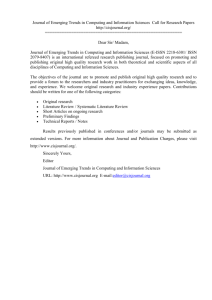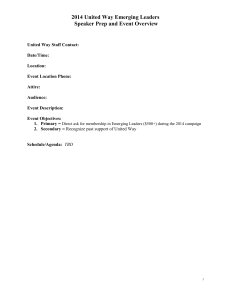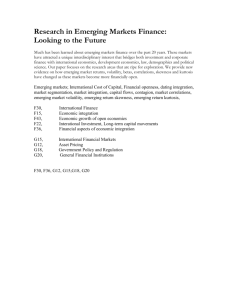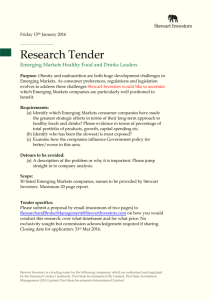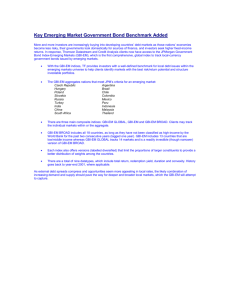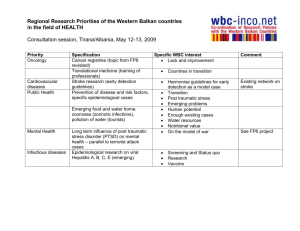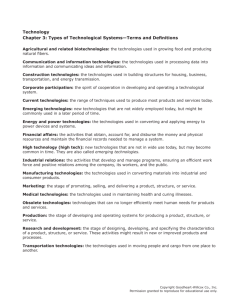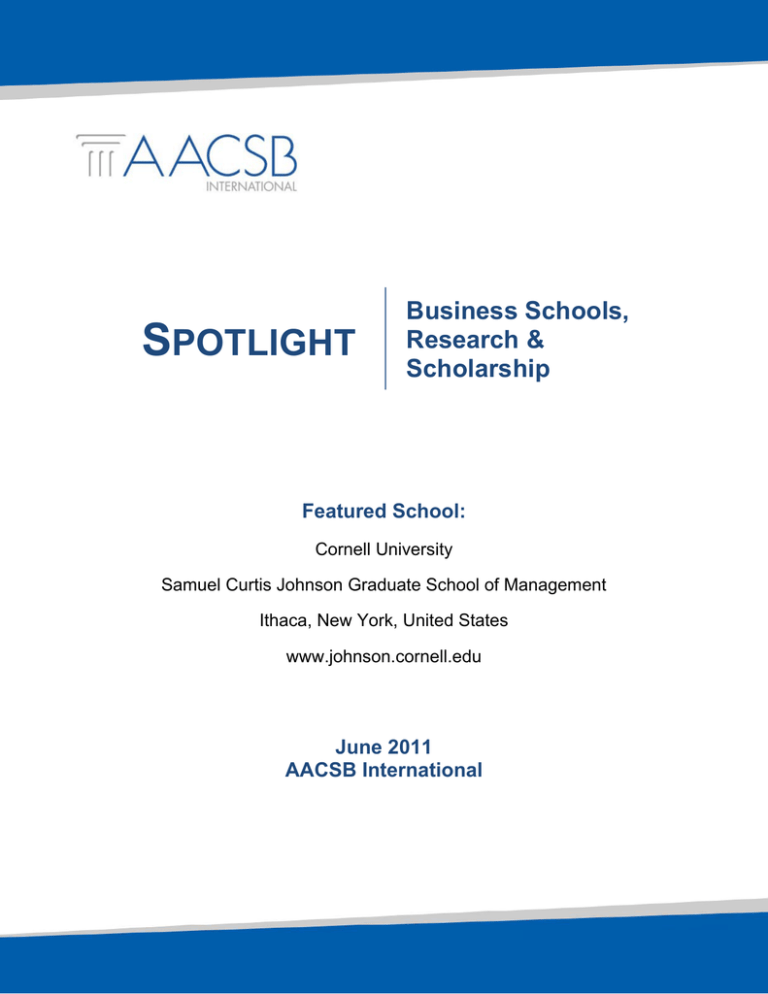
SPOTLIGHT
Business Schools,
Research &
Scholarship
Featured School:
Cornell University
Samuel Curtis Johnson Graduate School of Management
Ithaca, New York, United States
www.johnson.cornell.edu
June 2011
AACSB International
SPOTLIGHT | Business Schools & Research/Scholarship
Johnson’s Emerging Markets Institute | 2
Johnson’s Emerging Markets Institute
The Emerging Markets Institute (EMI) at the Johnson Graduate School of Management at
Cornell University was launched in the fall of 2010 with the aim to become a premier hub of
research and education on challenging emerging market issues.1 This dedicated and
internationally-focused center brings together preeminent practitioners and academics,
encompassing Cornell’s strong history and tradition of combining teaching, research, and
outreach in ways that intersect. Each of these three facets shares equal priority and strength in
the center. However, the EMI’s research activities, projects, and ambitions certainly help it
emerge among business schools as a premier and unique research institute.
Focusing on Emerging Markets
In January of 2009, Johnson faculty launched a strategic planning process that included
exhaustive inquiries into student educational and corporate research needs as well as an
assessment of the strengths and weaknesses of existing programs. This process resulted in the
identification of six initiatives, one of which called for efforts to help the school attain a more
“global” focus. Specifically, the school had noted strong demand among students, corporate
recruiters, and alumni for greater attention to emerging markets, and sought to begin planning
how to incorporate a greater focus on emerging markets into its educational, research, and
outreach activities.
The subsequent appointment of two faculty members, Dr Ya-Ru Chen and Dr. G. Andrew
Karolyi, with expertise in global dimensions of business allowed for deeper investigation into
what was necessary to execute this strategic initiative. Observing internationally-focused
initiatives under way at other business schools, including those at the numerous Centers for
International Business Education and Research (CIBERs), they concluded that too few seemed
to focus on emerging markets and that there would be an opportunity to provide leadership in
this area. Focusing inward, they then asked questions about the school’s existing capabilities
and its stakeholder needs, such as “Where were the strengths in the business school or at
Cornell that might support an enhanced focus on emerging markets?” and “Where were
students continuing their careers and what did those companies need?” After about a year of
planning, the Emerging Markets Institute was approved and became formally operational.
© AACSB International. All Rights Reserved.
SPOTLIGHT | Business Schools & Research/Scholarship
Johnson’s Emerging Markets Institute | 3
Randy Allen, Associate Dean for International and Corporate Relations and member of the EMI
faculty, notes that in many ways the Institute seemed a natural fit for Cornell University, which
upholds a long legacy of involvement in international markets; thus the initiative could be
effectively positioned with strong connections to the university as well as to the business school.
Additionally, the opportunity for faculty and research to tap into additional sources outside the
business school promised greater impact to educational content. Other institutes within the
business school, namely the Center for Sustainable Global Enterprise and the Entrepreneurship
and Innovation Institute, house faculty whose research also focuses on emerging market issues
and who also contribute to the EMI. Currently, about fourteen faculty members are directly
involved with research on emerging markets; others who either show interest in the topic or
have experience in different world regions complement their efforts. The school’s strong
research infrastructure helps assure that the EMI’s distinctive focus receives the support it
requires.
Allen further stresses that the focus of the institute differs from general emerging market
research and studies. Instead of focusing on a particular country or region, the institute is
modeled to look across emerging markets at the issues that arise among and between them.
She notes that “research focused on individual emerging market countries outpaces research
that cuts across emerging markets at a ratio of about 6 to 1.” With cross market issues (e.g.,
market deregulation, organizational change, management development, and supply chain
management problems) becoming more common, those involved with the EMI believe its
research and outreach are sure to greatly benefit the school and its stakeholders.
Research Activities in the EMI
Faculty play a key role in the research activities within the EMI. Although faculty had previously
been involved in substantial research on emerging markets, two specific goals of the Institute
are to make this research more accessible to the organizations that can benefit from it and to
encourage faculty to do more to embed findings within courses and curricula. To illustrate the
need for the former, Allen points to the period from 2005 to the present in which, although
roughly 5,000 papers focused on emerging markets were published, few have been published in
business publications read by business executives; most have not been readily available to
business people. This scenario has influenced EMI goals to convert Johnson research into
white papers that are readily accessible for industry leaders, as well as to develop a portal that,
© AACSB International. All Rights Reserved.
SPOTLIGHT | Business Schools & Research/Scholarship
Johnson’s Emerging Markets Institute | 4
among other functions, will provide managers with synopses of research organized by topic and
grant them access to blogs on key issues emerging from research.
Another research activity includes developing an Institute Fellows program. The goal of fellows
is to expand the research and teaching capability of the Institute. Fellows will be involved in
research with the Institute, as guest lecturers, seminar leaders or short-term visiting professors
and will enhance the overall knowledge base on emerging markets. The Institute’s first Fellow,
Professor Eswar Prasad of the Dyson School at Cornell University, is also a Senior Fellow at
the Brookings Institution, research associate at the National Bureau of Economic Research, and
previously held positions in the Financial Studies Division in the International Monetary Fund’s
Research Department and IMF’s China Division.2 Allen firmly believes that Prasad’s broad
emerging market focus will contribute to “the richness of research and education” in the
Institute.
While these research activities and seminars are intended to feed into various courses and
curricula, the EMI aims to provide more direct support for incorporating new research into the
school’s educational offerings through a grant program. The program offers grants to faculty
members and graduate students engaged in emerging market research. At first offered only to
faculty of the Johnson Graduate School of Management, the plan is to expand its availability
over time to faculty in other colleges at Cornell University or partner institutions who are also
involved in research aimed at better understanding the business environment across emerging
markets.
The Institute’s faculty at times are assisted by students interested in emerging market research.
For example, one student is currently researching the technology options to support
categorization of research, blogging, licensing of research, etc. Given the large workload taken
on by the small group of faculty, the Institute also contracts with two professional writers to
convert faculty research into the above mentioned white papers. As it moves into its second
year, the EMI plans to look into other support staff and is currently recruiting a full time
executive director.
© AACSB International. All Rights Reserved.
SPOTLIGHT | Business Schools & Research/Scholarship
Johnson’s Emerging Markets Institute | 5
Valuable Partnerships
Since last fall, the EMI has been actively focused on initiating discussions with schools in
emerging markets with which there is potential to develop research and teaching collaborations.
Although several exchange programs exist currently between Johnson and schools located in
emerging market regions, the EMI hopes to develop other opportunities such as data sharing,
joint educational opportunities among students in different locations, opportunities for more
faculty interaction to cultivate research relationships, as well as participation in joint conferences
(between academia and industry).
A relationship with industry partners is important to the EMI for several reasons. First on this list
is the EMI’s aim to ensure that its activities are relevant to business and that faculty have the
expertise to effectively prepare students to lead within companies that operate in emerging
markets. Allen’s observations suggest that more students coming from emerging market regions
are expressing an interest in returning to these regions after graduation; similarly, a growing
number of students from developed markets are showing a desire to one day work in emerging
markets. Fostering partnerships with industry members is an important means of securing
opportunities for students to gain hands-on experience on real-world projects while in the
program, and later help students secure jobs in those regions. Partners also provide speakers
for courses and the school as a whole helping bring their real experience into the classroom.
In regard to research, industry partners fulfill four major roles with the EMI, according to Allen:
1. Providing data from their operations in emerging markets for faculty research;
2. Identifying research topics and questions they would like to see converted into white
papers;
3. Suggesting research problems that could evolve into benchmark research or traditional
academic research; and
4. Helping to prioritize, on an annual basis, research interests of the Institute’s faculty by
providing feedback on identified topics of interest and suggesting ways in which
addressing those issues might be most useful.
Though not the primary function of the partnership arrangement, Allen notes that industry
partners also provide valuable funding that helps to sustain the Institute and support its
activities.
© AACSB International. All Rights Reserved.
SPOTLIGHT | Business Schools & Research/Scholarship
Johnson’s Emerging Markets Institute | 6
Thus far, industry feedback concerning the EMI is very good. As stressed earlier, the Institute
differs from other centers focusing on emerging markets in that it looks across markets, which
resonates positively with the cross-market issues that both developed and emerging market
multinationals encounter. An increasing number of companies based in more developed
markets are turning their attention to emerging markets or markets on the verge of crossing
from frontier to emerging. Many multinational corporations domiciled in emerging markets are
seeking expansion opportunities in developed and other emerging markets. Therefore they are
eager to work with students who have substantial experience, skills, and passion related to
emerging markets when seeking individuals who could potentially fill management positions.
Industry partners also benefit from having access to benchmarking research related to the
challenging issues they handle within their companies. According to Allen, the EMI frequently
acts as a “gateway” to information for these companies. When an industry partner approaches
the Institute asking for more information on a certain topic related to an emerging market, the
EMI is in a position to help connect the industry partner with other corporate partners, a faculty
member at another institution, or a database. Thus the industry partnership is a reciprocal one,
where both the Institute and the companies benefit from the gathering and dissemination of
emerging market data and research.
Finally, the EMI’s participation in various academic and academic-industry conferences aim to
enhance the research of the Institute and raise its profile with academics, business
professionals, and companies, and this has also resonated well with partners. For example, last
March the EMI co-hosted a day-long conference, “Brazil – A Pathway into the Future,” that
included panelists and keynote speakers made up of business leaders from Brazil and Johnson
faculty. Participants discussed business and investment opportunities in the emerging market of
Brazil.3 The conference was open to the community. The EMI also jointly sponsored a
conference with the Weiss Center for International Research at the Wharton School on the topic
of sovereign debt risk in April that showcased new academic research and involved active
participation from top asset managers with investment mandates in the emerging markets. The
EMI plans to organize and sponsor many more of these types of conferences that focus on
connecting academic research with business practitioners.
© AACSB International. All Rights Reserved.
SPOTLIGHT | Business Schools & Research/Scholarship
Johnson’s Emerging Markets Institute | 7
Acknowledgements: AACSB International is grateful for the assistance of Randy Allen, Associate Dean
for International and Corporate Relations and member of the EMI faculty.
© AACSB International. All Rights Reserved.
SPOTLIGHT | Business Schools & Research/Scholarship
Johnson’s Emerging Markets Institute | 8
End Notes 1
Satarupa Bhattacharya, “Dedicated center for emerging markets research at Cornell University,”
International Business Times, December 17, 2010. Electronic document,
http://www.ibtimes.com/articles/93270/20101217/emerging-markets-business-johnson-cornelluniversity.htm, accessed January 11, 2011.
2
EMI News, “Johnson's Emerging Markets Institute (EMI) presents discussion with its first Fellow,” March
2, 2011.Electronic document,
http://www.johnson.cornell.edu/Faculty-And-Research/Emerging-Markets-Institute/EMINews/ArticleId/333/Johnsons-Emerging-Markets-Institute-EMI-presents-discussion-with-its-firstFellow.aspx, accessed May 10, 2011.
3
EMI News, “Johnson's Emerging Markets Institute to offer a fascinating look at ‘Brazil - A pathway into
the future’ – March 4,” February 28, 2011. Electronic document, http://www.johnson.cornell.edu/FacultyAnd-Research/Emerging-Markets-Institute/EMI-News/ArticleId/321/Johnsons-Emerging-Markets-Instituteto-offer-a-fascinating-look-at-Brazil-A-pathway-into-the-future.aspx, accessed May, 10 2011.
© AACSB International. All Rights Reserved.

